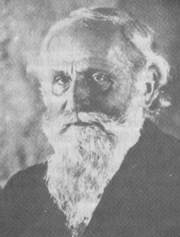
1859-1931
Ernst Leumann studied Indo-European languages and specialised in Jain literature and Khotanese manuscripts. Ernst Leumann was born on 11.4.1859 in Berg, Switzerland, the son of a clergyman. He took up the study of Indo-European languages in 1877. He studied in Geneva, Zurich and Leipzig, before going to Berlin in 1880. A year later he obtained a doctorate in Leipzig. The thesis was an edited Jain text Aupapatika Sutra. This edition was a remarkable achievement, as there was no critical dictionary or grammar available then. The Jain canon had also not yet been edited in print.
Leumann then worked on the manuscript collection in Berlin. Later in Oxford he worked for Monier-Williams' Sanskrit-English Dictionary. From 1884 to 1897 Leumann was professor in Strassburg. In 1919, after World War I, he left Strassburg. He settled in Freiburg where he stayed till the end of his life. He died on 24.4.1931.
Leumann compared Jain legends and stories contained in the canon from a philological point of view. He edited the Dasavaikalika Sutra and Niryukti in 1892. He realised that the many Jain versions of stories are important not only for Jain literature but also for Indian cultural history.
In later years, Leumann devoted his attention to Khotanese texts. Leumann's view, that the language of these texts was Northern Aryan, i.e., a language akin to Sanskrit, was not generally accepted by scholars, who considered it to be an Iranian language, the language of the Sakas.
Leumann's chief works are: Zur nordarischen Sprache und Literatur ("On Northern Aryan Langauge and Literature"), 1912; Maitreyasamhita, 1919; Neue Metrik I, 1920; Buddhistische Literatur, Nordarisch und Deutsch ("Buddhist Literature, Northern Aryan and German"), 1920; Buddha und Mahavira, 1922; Die nordarischen Abschnitte der Adhyardhasatika Prajnaparamita ("The Northern Aryan passages of the Adhyardhasatika Prajnaparamita"), 1930.